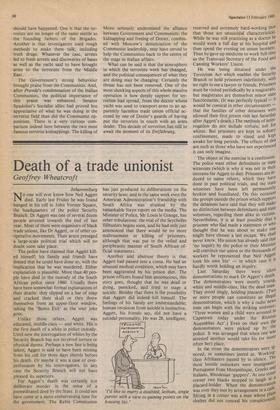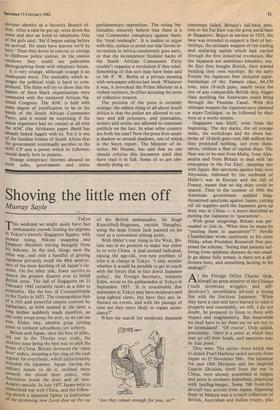Death of a trade unionist
Geoffrey Wheatcroft
Johannesburg No one will ever know how Neil Aggett died. Early last Friday he was found hanged in his cell in John Vorster Square, the headquarters of the police Security Branch. Dr Aggett was one of several dozen people arrested towards the end of last year. Most of them were organisers of black trade unions, like Dr Aggett, or of other co- operative movements. Their arrest presaged a large-scale political trial which will no doubt soon take place.
The police have claimed that Aggett kill- ed himself; his family and friends have denied that he could have done so, with the implication that he was murdered. Either explanation is plausible. More than 40 peo- ple have died in the custody of the South African police since 1960. Usually there have been somewhat formal explanations of their deaths: they slipped on a bar of soap and cracked their skull or they threw themselves from an upper-floor window, taking the 'Bantu Exit' as the sour joke goes.
Unlike those others, Aggett was educated, middle-class — and white. His is the first death of a white in police custody. Until now the interrogation of whites by the Security Branch has not involved torture or physical duress. Perhaps a new line is being taken; Aggett is said to have been missing from his cell for three days shortly before his death. Or maybe it was a case of over- enthusiasm by his interrogators. In any case the Security Branch will not have pleased its superiors.
For Aggett's death was certainly not deliberate murder in the sense of a premeditated deed by the State. It could not have come at a more embarrassing time for the government. The Rabic Commission has just produced its deliberations on the security laws; and in the same week even the American Administration's friendship with South Africa was strained by the remarkable Steyn report on the media. The Minister of Police, Mr Louis le Grange, has other tribulations: the trial of the Seychelles filibusters begins soon, and he had only just announced that there would be no more maltreatment or killing of prisoners, although that was put in the veiled and periphrastic manner of South African of- ficial statements.
Another and abstruse theory is that Aggett had passed into a coma. He had an unusual medical condition, which may have been aggravated by his prison diet. The prison officers found him unconscious, this story goes, thought that he was dead or dying, panicked, and tried to stage a suicide. Besides that there is the possibility that Aggett did indeed kill himself. The feelings of his family are understandable; human revulsion from suicide is instinctive. Aggett, his friends say, did not have a suicidal personality. He was 28, intelligent, 'I'd like to marry a disabled, lesbian, single parent with a view to gaining points on the housing list.' reserved and extremely hard-working (riot that those are unsuicidal characteristics). While he was still practising as a doctor he would work a full day at his hospital and then spend the evening on union business. Then he gave up medicine to work full-time as the Transvaal Secretary of the Food and Canning Workers' Union.
He was being detained under the Terrorism Act which enables the Security Branch to hold prisoners indefinitely, with no right to see a lawyer or friends. Prisoners must be visited periodically by a magistrate, but magistrates are themselves minor state functionaries. (It was perfectly typical — it would be comical in other circumstances that the families of other detainees were allowed their first prison visit last Saturday after Aggett's death.) The methods of inter- rogation do not include torture, not for whites. But prisoners are kept in solitary confinement, made to stand and kept awake for long periods. The effects of this are such as those who have not experienced it can only imagine.
The object of the exercise is a confession. The police want either defendants or state witnesses (which is why it was not in their interests for Aggett to die). Prisoners are In- duced to name others, which they have done in past political trials, and the state witnesses have been left permanently broken and humiliated. On this occasion the groups outside the prison which support the detainees have said that they will make no distinction between defendants and state witnesses, regarding them alike as victims. Nevertheless, it is at least possible that a prisoner who had made a statement or who thought that he was about to make one might have chosen a last escape. We shall never know. His union has already said that 'no inquiry by the police or their Minister will convince our union or the thousands of workers he represented that Neil Aggett took his own life' — in which case it Is hardly worth holding an inquiry. Last. Saturday there were silent demonstrations to mark Dr Aggett's death. The demonstrators were mostly young, white and middle-class, like the dead marl' They stood singly, holding placards. (Two or more people can constitute an illegal demonstration, which is why a radio news item can begin with the striking sentence: 'Three women and a child were arrested in Capetown today under the Riotous Assemblies Act'.) Even on their own the demonstrators were picked up by the police. It was arranged that when one was arrested another would take his (or more often her) place. In the street the demonstrators were ig- nored, or sometimes jeered at. Working' class Afrikaners passed by in silence. The most hostile onlookers were immigrants, Portuguese from Mozambique, Greeks and Italians, Rhodesian 'gappers'. At one street corner two blacks stopped to laugh at placard-holder. When the demonstration was over they met by arrangement in a cafe. Sitting in a corner was a man whose plain clothes did not conceal his conspicuouslY
obvious identity as a Security .Branch of- ficer. After a time he got up, went down the street and into an hotel to telephone. One of the girls said: 'He'd begun eating before we arrived. He must have known we'd be here.' Then they drove in convoy or cortege to HilIbrow police station. In the station windows they could see policemen Photographing them with telephoto lenses.
It is very strange, although strange is an inadequate word. The mentality which ar- ranges the political trials is hard to com- prehend. The State will try to show that the leaders of these black organisations were connected with the outlawed African Na- tional Congress. The ANC is held with some degree of justification to be in the hands of the South African Communist Party, and it would be surprising if the union organisers had no contact at all with the ANC (the Afrikaans paper Beeld has already linked Aggett with it). Yet it is one of the familiar ironies of South Africa that the government continually ascribes to the ANC-CP axis a power which its followers would dearly loVe to possess.
Strange conspiracy theories abound on both sides, government and extra- parliamentary opposition. The ruling Na- tionalists sincerely believe that there is a vast Communist conspiracy against them, the 'total onslaught'. It is Useless to argue with this, useless to point out that Soviet in- tervention in Africa consistently goes awry, or that the incompetent Stalinist hacks of the South African • Communist Party couldn't organise a revolution if they tried. Something of this sort may have been said to Mr P. W. Botha at a private meeting with newspaper editors last week. Whatever it was, it provoked the Prime Minister to a violent outburst, in effect accusing the press of collective treason.
The position of the press is certainly strange: the oddest thing of all about South Africa is that the police are allowed to tor- ture and kill prisoners, and journalists, writers and artists are allowed to comment publicly on the fact. In what other country are both the case? Now the press lives under a shadow or several shadows, one of which is the Steyn report. The Minister of In- terior, Mr Heunis, has said that no one should criticise this document until they have read it in full. Some of us are obe- diently doing so.











































 Previous page
Previous page